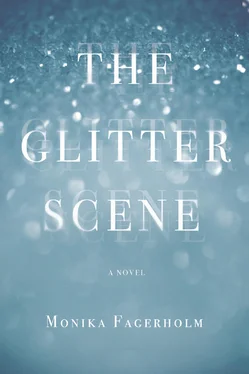Now they were walking in silence back on the path toward the road, she with her backpack in hand, he with the shovel. He says he saw her from the cousin’s house. Saw her take the shovel from the barn, became curious. She says quickly that she only wanted to borrow the shovel, she knew there was a shovel there since she used to come to the house and clean when the old man was still alive, she works for Solveig’s cleaning company. And then suddenly it also occurs to her who he is. Here. The Boy in the woods . Solveig’s brother. Bengt.
How long had he been here, in the cousin’s house? He shrugs. A while. Then Susette thinks he looks the way she had imagined based on Solveig’s descriptions. Like someone who has been here and there and at some point stopped accounting for anything, even with just a little bit of effort, placing anything into some sort of context, coherence. “Completely washed up.” Which Solveig had also said, in the company car. “Gone to hell.”
He takes her hand on the forest path. Strange. She squirms out of his grip and when they come out of the woods she keeps going, alone. Along the road, in the direction of the main country road and the town center. She walks for several miles, then the bus from the capes comes, she gets on.
We can leave her here, Susette Packlén. Wandering forward along the road, one fall day in the sun, the Fjällräven backpack dangling over her shoulder. Small poor child I am, in cowboy boots, boots . Or on the bus, where she is the only passenger on this Sunday morning. Gets off at the square in the town center, walks home.
Arrives at her apartment, it is well cleaned. Hangs her backpack on the hook in the bathroom, again. Yes, she has forgotten the pistol; it was going to go back to the cousin’s house of course. At the bottom of the backpack, wrapped in a towel, that too, as always.
At that point she is so tired that she falls asleep with her clothes on, on the sofa in her tiny living room. Sleeps for a long time, without dreaming.
And in the evening, he is there. At her door, ringing the bell. “Hey.” Newsstand toppler . She invites him in.
•
Newsstand toppler? One evening, a weekday a few weeks later, Maj-Gun Maalamaa is at Susette’s door. She has two trays of cat food, in cans, 2 × 24 in each, which she bought at the wholesale store where she actually should not be allowed to shop, not even for the newsstand, because all of the acquisitions at the newsstand are dealt with centrally by the Head Office. But Maj-Gun has been to the wholesale store anyway, with her wholesaler’s card, on the newsstand’s budget, in and of itself, on the Head Office’s behalf. Something in the stockroom that had run out, needed to be restocked quickly. Chewy ducks, small sweet troll hearts filled with truffel or the like which there is a rapid consumption of in certain seasons at her newsstand on the square in the town center. You barely have time to fill the minimal plastic bags in which the sweets are sold, five or ten in each, tied at the ends in knots, and they are sold out. So Maj-Gun has, in exceptional cases, been driven in the Head Office’s truck to the wholesaler in the industrial area on the outskirts of the city by the sea, from the newsstand and back.
The cat food she had probably paid for with her own money at the wholesale shop: a whole load to drag around, the apostle’s horses, from the square almost half a mile past the new and the old cemeteries to the apartment complex where Susette lives in the hills above the town center.
Filled with anecdotes from the day and similar days and the past days—it has been a while since Susette properly visited the newsstand in the evenings—Maj-Gun rings Susette’s doorbell in the D-block.
•
Susette opens and Maj-Gun walks in, “here,” giving the cat food cans to Susette and luring kitty kitty kitty but then she is already in the tiny living room and there is the Boy in the woods, he says “hi.”
“The cat?” is the only thing Maj-Gun gets out, she is standing in the middle of the room. Susette, behind her, says that it is not there anymore, “It got run over.”
There is a language that is called the Winter Garden . Pictures on the wall, soiled water colors and a sweetness in the room, stink, tobacco, sweat, beer.
My love, pure and true .
The surprise, the heartbreak. Maj-Gun, speechless, stumbles out.
We can leave her here.
•
Maj-Gun and Susette, November 1989 . They meet again, it is about a month later then, at the beginning of November, in the boathouse, the American girl’s hangout on the Second Cape. Snow is suddenly pouring down: in the morning, or maybe it was early afternoon, when Maj-Gun came down there to the boathouse, the ground was still bare, the hard wind, the waves were crashing against the other side of the pine forest grove. Cold, yes, but the freshness, the openness, coming there.
To the boathouse, that is where she is, Maj-Gun Maalamaa, sleeping on the floor in the middle of the room among old junk; nah, nah, not exactly the leftovers of some old story, no remains like that either, meaningless now, so long ago. But things from the sea, fishing tackle, the like—a broken outboard motor that someone had thrown an old rug over. It is the rug Maj-Gun pulls over herself on the floor. Falls asleep, sleeps deeply, does not dream about anything in particular, about the square maybe, hayseeds at the square, pistol awakening with their revolvers, how they shot the empty tin cans. Not a dream you have been longing for either; one of these hayseeds had, earlier that morning, picked her up when she was wandering around in the town center and driven her out to the Second Cape and gotten rid of her after a brief exchange of words a few miles from the cousin’s house where she had later walked, and been there, before she came here.
And when she wakes up on the floor in the boathouse it is almost with a smile about her dream, then she becomes aware of where she is, and the snow that is snowing now and—a dark shadow on the terrace. She crawls up, Susette turns around, and they discover each other at almost the same time, on either side of the window. Both of them just as surprised, it was not the intention after all, in no way was it arranged.
Susette comes into the boathouse. Words are exchanged, maybe no words. But Susette who is just standing there, with her big empty eyes and Maj-Gun who attacks her, suddenly, hits and hits and hits. Things to add to the Winter Garden: Young man against a background of flames, 1952, was it in Rio de Janeiro? But in any case, that place, a hotel room, where Liz Maalamaa hit the wall for the first time, hamba hamba, the Girl from Borneo, she had bought one of those statues at the market, the one that flew out of her hand when she flew in the room, on top of the bed, the last thing Liz Maalamaa saw before she lost consciousness, everything went black, a portrait: young man against a background of flames, on a wall. Or did she see? Because in reality, when she came to again, there was only a bouquet of flowers in a vase on the wall and her husband was remorseful, bought her silver shoes, that was him . But Maj-Gun Maalamaa in the boathouse in the month of November 1989 who hits and hits: and Susette Packlén, little Susette Packlén, who does not put up a fight really, loses her balance, falls backward, hits her head on an anchor and just lies there. Already dusk now, Maj-Gun who leaves and walks out into the snow.
And up in the cousin’s house, on the other side of the grove of pine trees, the Boy in the woods . He is lying on the floor in a room as well, in blood.
Walk walk in whiteness and walk in whirling snow that shrouds you, walk walk walk in the snow.
Читать дальше











